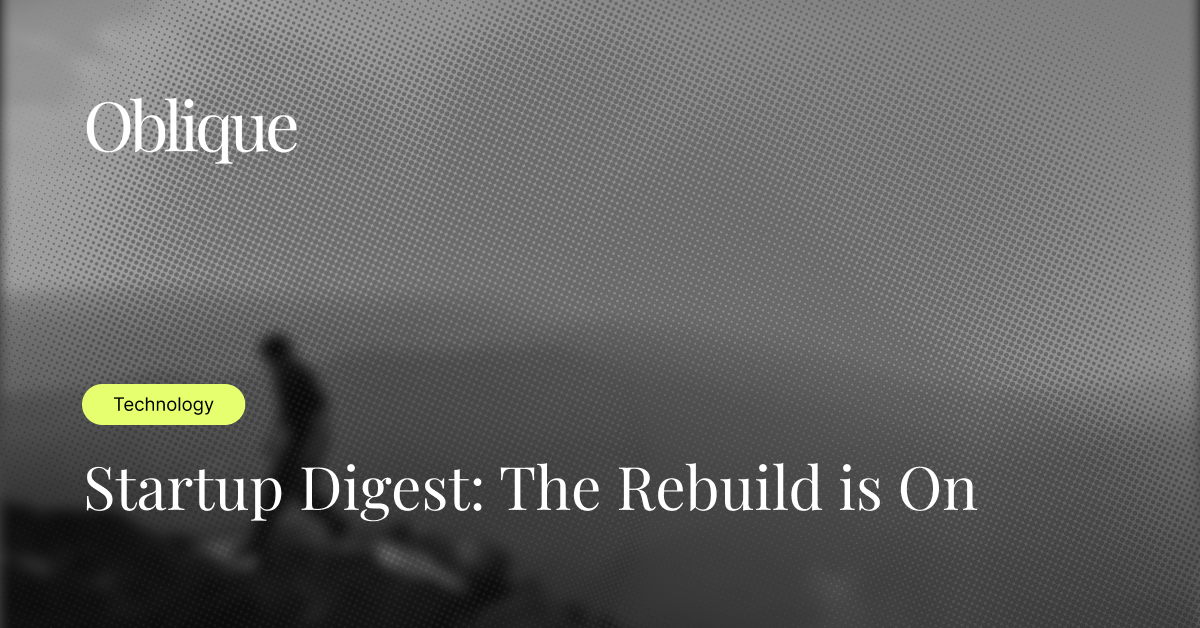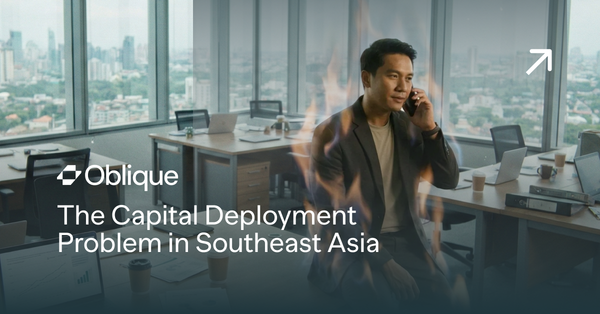The Rebuild Is On. And It’s Not Where You Think.
Thailand’s digital banks go live, Airwallex hits $6.2B, and Davao stuns with record startup growth. We break down the week’s biggest moves reshaping Southeast Asia’s tech ecosystem.

This Week's Power Moves
Thailand's Virtual Banking Revolution Hits Implementation Phase
Thailand's digital banking landscape reached a critical inflection point this week as the Bank of Thailand confirmed that three virtual banking licenses awarded in June 2025 are moving into operational planning 1. The heavyweight consortiums—led by Krungthai Bank, SCB X, and Ascend Money—are now required to launch services within one year of ministerial approval, marking Thailand's formal entry into the virtual banking era alongside regional pioneers Singapore and South Korea.
Why it matters: This represents more than regulatory milestone—it's Thailand positioning itself as the next major fintech battleground in Southeast Asia. With Ascend Money's TrueMoney already serving 32 million users and SCB X partnering with proven players like KakaoBank, these aren't experimental ventures but full-scale infrastructure plays designed to capture underserved segments that traditional banks have struggled to reach 1.
Airwallex Hits $300M Series F at $6.2B Valuation
Australian fintech Airwallex closed a $300 million Series F round at a $6.2 billion valuation, demonstrating that quality growth companies can still command premium valuations even in the current funding environment 2. The round, which included both primary and secondary components, attracted participation from Square Peg, DST Global, and notably, Visa Ventures as a strategic investor.
Why it matters: Beyond the impressive fundraising numbers, this signals that infrastructure-focused fintech companies with clear paths to profitability are finding receptive markets. Airwallex's trajectory toward $1 billion in annualized revenue in 2025 validates the thesis that cross-border payment infrastructure remains a high-growth category despite broader fintech headwinds2.
Davao City Claims Southeast Asia's Highest Startup Growth Rate
In a surprising development from the Philippines, Davao City emerged as the country's third-best startup ecosystem with a remarkable 97% growth rate—the highest in the Philippines and among the top performers globally 3. The city jumped 163 places to rank 580th globally in StartupBlink's 2025 Global Startup Ecosystem Report, making it the only Philippine city to improve its ranking.
Why it matters: This exemplifies the "unexpected cities" trend we're seeing across Southeast Asia. While Manila and Cebu dominate headlines, secondary cities like Davao are quietly building robust innovation ecosystems through focused government support and grassroots entrepreneurship—a pattern we're seeing replicated across the region 3.
Region-Wide Ripples
Malaysia Launches Full-Scale Startup ASEAN Platform
Malaysia unveiled the Startup ASEAN platform in June 2025, marking a significant step toward regional startup ecosystem integration4. Spearheaded by the Ministry of Science, Technology and Innovation under Malaysia's 2025 ASEAN Chairmanship, the platform serves as a unified digital gateway connecting startups across all ASEAN member states to funding, talent, and market opportunities.
Why it matters: This represents the first major infrastructure play designed to treat ASEAN as a single market for startup activity. By providing centralized access to regional opportunities and creating pathways for cross-border collaboration, Malaysia is positioning itself as the ecosystem coordinator for Southeast Asia's fragmented startup landscape 4.
Southeast Asia Fintech Funding Rebounds to $776M in H1 2025
The region's fintech sector showed signs of recovery with $776 million raised in H1 2025, representing a 31% increase from H2 2024 5. However, the rebound was heavily concentrated in late-stage deals, with Singapore capturing 88% of total funding—underscoring the city-state's continued dominance as the region's fintech hub.
Why it matters: While the headline numbers suggest recovery, the distribution tells a more complex story. Three companies (Thunes, Airwallex, and Bolttech) accounted for most of the mega-rounds, while early-stage funding collapsed by 65% year-over-year. This points to a maturing market where proven players access capital while newcomers face increasingly challenging conditions5.
Indonesia's Digital Financial Assets Regulation Takes Effect
Indonesia's Financial Services Authority (OJK) completed the transition of crypto asset supervision from Bappebti to OJK in January 2025, implementing comprehensive new regulations under OJK Regulation No. 27/2024 6. The new framework requires digital asset operators to meet enhanced governance, cybersecurity, and consumer protection standards within specific timelines throughout 2025.
Why it matters: This regulatory transition represents Indonesia's maturation as a digital asset market. By bringing crypto assets under financial services supervision rather than commodity regulation, Indonesia is creating a more sophisticated framework that could serve as a model for other Southeast Asian nations still grappling with digital asset governance6.
Undercurrents
Vietnam's Web3 Regulatory Breakthrough
Vietnam achieved a significant milestone in June 2025 by passing the Digital Technology Industry Act, which provides legal framework for cryptocurrencies and digital assets for the first time 7. The law, taking effect January 1, 2026, includes regulatory sandboxes for controlled experimentation and positions Vietnam to become a Web3 hub by 2030.
Why it matters: This is the contrarian story of the quarter. While many countries remain cautious about crypto regulation, Vietnam—already ranking 3rd globally in crypto adoption—is embracing regulatory clarity as a competitive advantage. The law's sandbox provisions and goal to create 20 domestic blockchain brands represent a bet on Web3 becoming mainstream infrastructure rather than a speculative asset class 7.
Sygnum Emerges as Southeast Asia's Lone 2025 Unicorn
Singapore-based digital asset banking group Sygnum achieved unicorn status with a $58 million funding round in January 2025, becoming the region's only new unicorn in H1 2025 8. The company's path to billion-dollar valuation reflects the growing institutional adoption of digital assets and the maturation of crypto banking infrastructure.
Why it matters: In a funding environment where unicorn creation has nearly ceased, Sygnum's success highlights the opportunity in regulated digital asset infrastructure. Their focus on institutional clients and multi-jurisdiction compliance positions them ahead of broader institutional crypto adoption—a trend that could accelerate as traditional finance fully embraces digital assets 8.
Deep Tech Funding Shift Toward AI Infrastructure
Southeast Asia's deep tech sector experienced a notable shift in 2025, with AI and infrastructure startups commanding increased investor attention despite an overall 34% decline in deep tech funding9. Early-stage activity maintained momentum while late-stage funding collapsed, reflecting investor caution about scaling unproven technologies.
Why it matters: This reflects the broader global trend toward AI infrastructure investment, but Southeast Asia's position remains challenging. The region's lack of high-performance computing resources and fragmented markets make it difficult for AI startups to compete with Silicon Valley and Chinese counterparts, suggesting a need for coordinated regional infrastructure development 9.
Signals from the Ecosystem
Accelerator Programs Pivot to Specialized Sectors
The Founder Institute Philippines launched its 2025 program in July, while specialized accelerators like ASEAN Sparks focused exclusively on clean energy startups 10 11. This specialization trend reflects the maturation of Southeast Asia's startup ecosystem, where generalist accelerators are giving way to sector-specific programs with deeper domain expertise.
Why it matters: The shift from general startup acceleration to specialized programs indicates ecosystem maturation. As Southeast Asia's startup scene becomes more sophisticated, founders need domain-specific expertise rather than generic business development—a trend that should produce higher-quality startups with better product-market fit 10.
Singapore's IPO Market Shows Signs of Life
Singapore's IPO market demonstrated renewed activity in the second half of 2025, with Info-Tech Systems marking the first Mainboard listing in two years12. The Monetary Authority of Singapore's $5 billion capital injection program and streamlined listing requirements are beginning to show results, though the market remains cautious.
Why it matters: Singapore's IPO revival efforts represent a critical test of whether regulatory incentives can revitalize public markets. Success here could provide a template for other Southeast Asian exchanges struggling with similar challenges, while failure might indicate deeper structural issues in regional capital markets12.
Tech Winter Evolves into "Tech Fog"
Industry observers are reframing Southeast Asia's prolonged funding downturn as a "tech fog" rather than a temporary winter13. This semantic shift reflects the recognition that current market conditions may represent a new normal rather than a cyclical downturn, requiring permanent adjustments to startup strategies and investor expectations.
Why it matters: The terminology change signals a fundamental shift in how the ecosystem views current conditions. Rather than waiting for a return to 2021-era funding levels, stakeholders are adapting to a more capital-efficient, unit-economics-focused environment that may actually produce stronger, more sustainable companies in the long term 13.
The week's developments suggest Southeast Asia's tech ecosystem is entering a new phase of maturation, characterized by regulatory clarity, specialized infrastructure, and more discerning capital allocation. While funding remains constrained compared to peak years, the quality of deals and focus on sustainable growth indicates a healthier foundation for long-term innovation.





